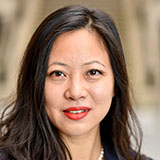It's really important that we acknowledge gendered violence as more than domestic and intimate partner abuse. We need to understand the ways in which all types of gendered violence are underpinned by power hierarchies which are implicated in economic and social inequalities but also in patterns of colonialism and state violence.
Professor Cathy McIlwaine
01 December 2021
The effects of gender inequality across the world
New podcast episode looks at how gender bias, gendered violence and gender pay gaps are affecting women and wider society

The latest episode of the 'WORLD: we got this' podcast explores how gender inequalities are having an impact on different societies across the globe and hears what could be done to create a more equal world.
In the episode, Dr Ye Liu, Professor Cathy McIlwaine and Dr Aleida Borges, who all work in the Faculty of Social Science & Public Policy, share research on what lies behind gender inequalities, some of the effects this has on society and their ideas for bringing about change.
Professor Cathy McIlwaine, of the Department of Geography, talks about the gendered nature of urban violence and how this affects women living in Brazil’s favelas. She also highlights how migrant woman in the UK are facing violence, which they are afraid to report for fear of deportation and not being believed.
She shares examples of activism in countries across Latin America from women demanding change, which have been picked up across the world and remind us that these experiences are universal albeit in intersectional ways.
To help tackle the issue, she calls for more funding for organisations helping women, further legislative changes, and greater use of international conventions to protect women and girls against violence.
Dr Ye Liu, of the Department of International Development and the Lau China Institute, discusses the ways in which gender bias in China is affecting women’s lives and has combined with population policies to create significant demographic pressures for the country.
This includes a higher ratio of men to women resulting from the one child policy and discriminatory workplace practices that are affecting women’s decisions on whether to have children.
So, women, when they want to have children have to discuss their maternity plan with their line managers. And they need line manager approval before these women can actually plan to get pregnant. Some women also shared stories of when they were pregnant, they were considered to have a baby brain. They had their projects taken away from them. Or when they returned from maternity leave, they had to start from 'Ground Zero'.
Dr Ye Liu
She outlines steps the Chinese Communist Party could take to make society more gender progressive including putting more women in leadership roles, better childcare provision, ending workplace discrimination and greater recognition of the growing “she economy” in China.
Dr Aleida Borges shares details of a recent Global Institute for Women’s Leadership report she co-authored. It explores progress on the gender pay gap in six different countries. and revealed how in some countries, such as the UK and Australia, little progress is being made because organisations are only required to report on the issue and no action is required.
To help address the gender pay gap, she suggests requiring employers of all sizes to produce action plans, and calls for governments to improve parental leave, consider better how inequalities intersect and she wants to see more women in leadership positions. She believes this would benefit the whole of society.
Gender inequality in the workplace is not only an ethical and social problem, but it also hinders economic development. Despite progress in improving women's education and labour market integration, economic gender gaps have been much slower to close, with the World Economic Forum estimating that it will take over 250 years for the world to reach economic parity between men and women.
Dr Aleida Borges
How to listen
You can find the full episode and previous seasons’ episodes on Acast here or through your preferred podcast provider by searching for ‘WORLD: we got this’.
This season of the WORLD: we got this podcast is a partnership between the Faculty of Social Science & Public Policy and the School of Global Affairs and will feature both themed and ‘In Conversation’ episodes.
- If you are interested in hearing more about the issue of violence against women in Latin America, you might like to take a listen to a new three part podcast series 'Women resisting violence' launched last week by Professor McIlwaine, Professor Jelke Boesten also from King’s and a team at the Latin America Bureau.



